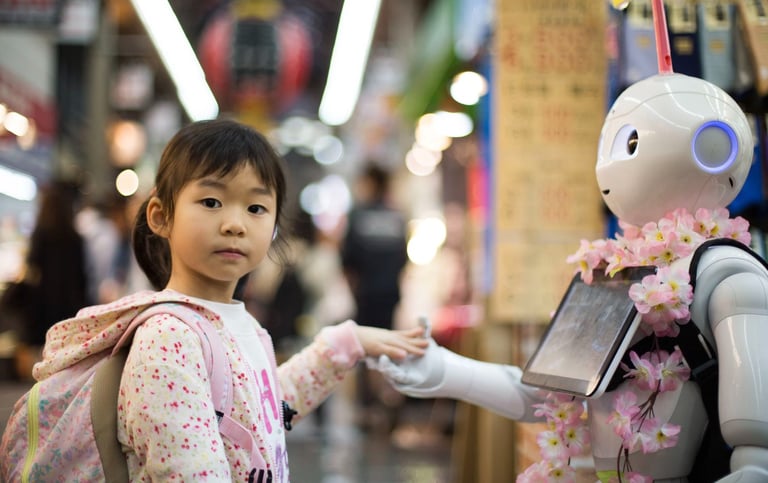Man vs. the Machine: The Future of AI in Retail and Digital Commerce
AI is the next big thing in retail and ecommerce, but do we truly understand it? What are the implications for the future of AI in retail
DIGITAL TRANSFORMATIONDIGITAL COMMERCECURIOSITY
This is the question posed by Alan Turing in 1950 that started it all. And now, just over 70 years later, artificial intelligence (AI) is making its way into our lives in a big way.If you’re in the retail and ecommerce business, you’ve surely noticed how the technology is now being built into martech and other software products. AI is the big buzz across other industries too, as everyone seems to be jumping on the artificial intelligence bandwagon.
Which begs the question, do we actually understand what AI is? And what are its potential implications?
What is AI?
What is artificial intelligence and how does AI work? In simple terms, artificial intelligence refers to machines (often computer systems) capable of simulating human intelligence—specifically traits like learning, reasoning, problem-solving, and self-correction. The term also encompasses the specific branch of computer science concerned with building such systems.
Again, put very simply, artificial intelligence systems work by taking in massive amounts of data, analysing it to find patterns and correlations, and then using those patterns to predict future outcomes. Kind of like how we humans use lessons from past experiences to make educated guesses (predictions) about what will happen. Or how we (hopefully) learn from our mistakes in order to avoid repeating them. AI in action combines several approaches including machine learning, deep learning, and algorithms (sets of rules applied based on certain triggers). On top of that, the systems may apply reasoning and learning processes to help it choose the right algorithm for the job, and to fine-tune the results over time.
Common misconceptions about AI
Much like any “next big thing” AI comes with much speculation and, often, misunderstanding. One of the prevalent myths is that computers will take over the world—or at least our jobs. Thankfully, that’s not likely to happen anytime soon.Most of what we use today is considered “narrow AI” or “weak AI” meaning it’s built to handle a single, specific task. In fact, much of what we think of as AI is commonly mislabeled. Software providers love to tout their programs and features as AI. When in fact, they may only be utilising one component of artificial intelligence, such as machine learning or algorithms.
In contrast to narrow AI is Artificial General Intelligence (AGI) or “strong AI”. This is the scary stuff of sci-fi movies and books. AGI systems would be so advanced as to be aware of their own existence and the existence of others. And their intelligence so high-level that it could be applied to virtually any task.We’re still light years away from achieving these more complex forms of AI. Besides, the technology is so expensive that it will likely only be accessible to governments and major institutions. And don’t forget, we still program the computers.That’s not to say that rules-based organisation can’t be incredibly helpful in the world of digital commerce. Or any industry where you’re dealing with massive amounts of data, for that matter. Computer-led automations can bundle, organise and recommend products quickly and accurately. This doesn’t replace your humans; rather it frees them up for more pressing tasks.
What does AI in retail look like?
Examples of artificial intelligence we’re all familiar with include Siri, Alexa, Netflix and Amazon recommendations, chatbots, and self-driving cars.When it comes to AI and the future of retail & ecommerce, some of the most popular use cases include things like:
Predicting demand and forecasting inventory by using computer vision to “see” into shoppers’ carts
On-the-spot product recommendations based on what person is buying (both at physical and digital POS)
Automated, predictive in-store assistance
Determining shelf and floor space for new product releases
Using body scanning technology to help customers find the perfect fit
The takeaway
There’s loads of potential, but we still have a long way to go when it comes to AI. Both with the tech itself and with human trust in that technology. The first step is being open to the concept that technology can indeed help you work better, faster, and at lower cost.
AI helps greatly with the heavy lifting of data processing, as well as finding anomalies and trends within that data (aka pointing us in the right direction). But at the end of the day, digital transformation is about turning data into insights, and then putting them into action. And that’s still a job best done by humans.
With over 60 years of combined experience, our consulting firm helps ambitious companies make smarter digital decisions. Our diagnostic frameworks are designed to identify root causes of underperformance combined with rapid action to ensure our clients get real value.
Whether you’re a founder, owner or digital operator we can help you grow faster by making smarter decisions. Let’s connect.
“Can machines think?”


